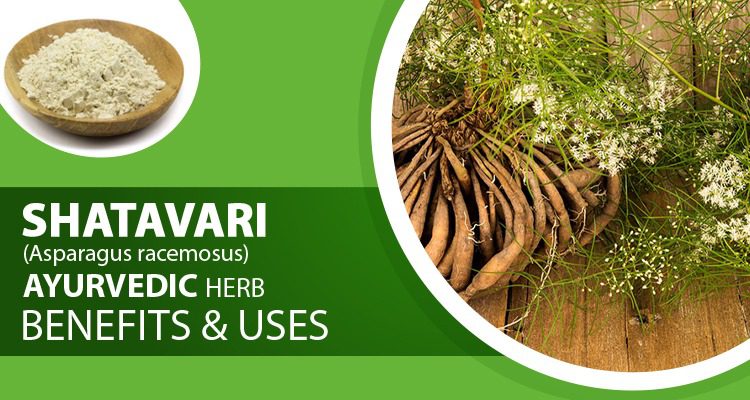Shatavari Health Benefits, Uses & Dosage:-
Introduction of Shatavari (Asparagus racemosus): Shatavari is the most important medicinal plant, which is regarded as a ‘Rasayana’, which means plant drugs promoting general well-being by increasing cellular vitality and resistance. In Ayurveda’s ancient literature (Charak Samhita), Shatavari benefits are described and are indicated in vata disorders, epilepsy, cardiac disorders, extensively used in male genital dysfunctions, such as oligospermia, spermatogenic irregularities, painful micturition, etc. Also, it provides relieves from bloating, indigestion, piles, amoebiasis, debility, etc. It also works effectively in uterus weakness, excessive bleeding during menstruation, habitual abortions, etc.
In Researches, it was proved that Shatavari acts as an anti-spasmodic, anti-diarrhetic, aphrodisiac, diuretic, anti-dysenteric, demulcent, reinforce the immune system, protect vital organs like the brain, heart, and other organs of the body.
Synonyms of Shatavari (Asparagus Racemosus):
In other words, Shatavari can be termed as vari, satavirya, atirasa, indeevari, sukhmaptra, peevari, shatapadi, satamuli, rushyaprokta, urdhvakantaka, etc.
Different Names of Shatavari (Asparagus racemosus):
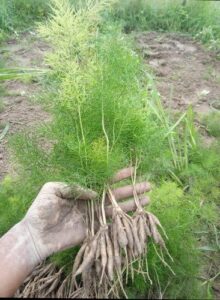
Sanskrit: Satavari
Hindi: Satavari, Shatawar or Satmuli
Bengali: Shatamuli
Marathi: Shatavari or Shatmuli
Gujarati: Satawari
Telegu: Toala-gaddalu or Pilli-gaddalu
Tamil: Shimaishadavari or Inli-chedi
Malayalam: Chatavali
Kannada: Majjigegadde or Aheruballi
Madhya Pradesh: Narbodh or atmooli
Kumaon: Kairuwa
Rajasthan: Norkanto or Satawar
Classifcation of Shatavari (Asparagus racemosus):
Kingdom: Plantae
Subkingdom: Tracheobiont
Division: Magnoliopsida
Class: Magnoliopsida
Subclass: Magnoliidae
Order: Asparagales
Family: Liliaceae
Genus: Asparagus
Species: Racemosus
Ayurvedic Properties of Shatavari (Asparagus racemosus):
Rasa (taste): Madhura (sweet), Tikta (bitter)
Guna (qualities): Snigdha (oily, unctuous), Guru (heaviness)
Vipaka (taste conversion after digestion): Sweet (madhura)
Veerya (potency): Sheeta (cold)
Effect on Tridosha: Shatavari balances Vata and Pitta dosha.
Cultivation and Morphology of Shatavari (Asparagus racemosus):
From ancient times, Ayurvedic Acharyas used the plant’s roots as an herbal remedy for diseases of the spleen, liver, and other internal organs, including preventing miscarriage. In India, conventionally, Shatavari’s origins have been utilized during internal pain, tumors, fever, and tonic.
Shatavari is a climbing plant consisting of tuberous roots. Shatavari consists of small needle-like phylloclades (photosynthetic branches), which uniform and shiny green in appearance. Leaves of the Shatavari plant are reduced to minute scales and spines. Fruits are rounded and purplish black.
Roots are approx 5-15 cm in length and 2 cm in thickness. They are more or less smooth when fresh, and start to develop longitudinal wrinkles upon drying. The inner parenchymatous zone’s cortex is arranged of around 20-24 layers in the upper portion and 42-47 layers in the middle of the root tuberous portion. Cells are thin-walled and composed of cellulosic fibers, circular to oral outlines, and distinct intercellular spaces. In some roots, there are 3-4 layers of cortex immediately adjacent to the endodermis that are modified into a sheath of stone cells round the endodermis.
The number of vascular bundles ranges from 30-35 in the upper levels and 30-40 in the root’s middle tuberous portions. The roots are light brown with a coarse texture. Shatavari plant mainly prefers light (sandy), medium (loamy), and heavy (clay) soil.
Part Used: Roots
Chemical Constituents of Shatavari (Asparagus racemosus):
Shatavari’s chemical constituents consist of many molecules in which principal component is steroidal saponins, alkaloids, flavonoids, dihydrophenanthrene derivatives, furan derivatives, and volatile components. There is a total of 29 steroidal saponins, which were reported from Shatavari. An oligospirostanoside named 3-0-[α-L-rhamnopyranosyl-(1→2)-α-L-rhamnopyranosyl-(1→4)-O-β-D-glucopyranosyl]-25(S)-spirosta-3β-oil is obtained from Shatavari, which on oral administration potentiated antibody synthesis and enhanced cell-mediated immune response. Also, it contains a wide range of Shatavarin VI and Shatavarin VII. Shatavari roots have a high content of Sarsapogenin, two spirostanolic & two furostanolic sponins; Sitosterol, Asparagamine A.
Classical Categorization of Shatavari (Asparagus racemosus):
In Charak Samhita:
Balya: a group of herbs promotes immunity and strength
Vayasthapana: Anti-aging herbs
Madhura skandha: group of herbs having sweet taste.
According to Vaghbata Ji:
Vidarigandhadi
According to Acharya Sushruta Ji:
Pitta shamaka: a group of pitta balancing herbs
Vidarigandhadhi
Kantaka panchamula.
Classical Uses of Shatavari (Asparagus racemosus):
Following are the classical uses of Shatavari that are mentioned in the Ayurvedic texts:
Hrudya: congenial for heart
Arshghana: useful in piles, hemorrhoids
Agnivardhini: increases digestion strength
Rasayani: acts as an anti-aging, rejuvenate cells and tissues
Nayanamaya hara: useful in eye disorders
Balaya: improves immunity and strength
Medicinal Uses of Shatavari (Asparagus racemosus):
Shatavari contains many medicinal properties due to which this herb is used in multiple health conditions:
Vrushya: Acts as aphrodisiac
Asrajit: Effectively in blood disorders
Shukrala: Improves the quality of sperm and semen
Medhya: Improves memory power
Atisarajit: relieves diarrhea
Garbhaprada: provide relieves from infertility
Pittasrahara: useful in bleeding disorders such as nasal bleeding, rectal bleeding, menorrhagia, etc.
Retodoshahara: Improves sperm and semen health
Pushtida: Nutritious
Other than this, Shatavari acts as an antispasmodic, diuretic, antidiarrhetic, aphrodisiac, demulcent, antidysentric, galactagogue.
Shatavari benefits are highly effective in burning sensation, excessive perspiration, cough, bronchitis, skin diseases, abdominal pain, digestion-related disorders, etc. Shatavari plant is considered to be the primary Ayurvedic rejuvenating female tonic for overall health and vitality.
Health Benefits of Shatavari (Asparagus racemosus):
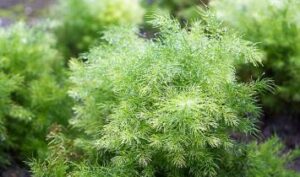
The most common Shatavari uses are mentioned below:
Shatavari for Women:
Shatavari is one of the amazing herbs that support women through every stage of their lives. Shatavari is rich in steroidal saponins that suggest its use as an estrogen regulator. There are multiple uses of Shatavari for women. It regulates the cycle of menstruation, manages PMS symptoms, controls the amount of blood, alleviates menstrual cramps, retain fluid, uncomfortable bloating often suffered before a period, and supports the functioning of female reproductive system thus counting to Shatavari benefits.
Acts as a diuretic:
Shatavari effectively fights against urinary tract problems and pelvic inflammatory diseases. Its regular uses maintain the bladder’s health and help reduce the size of kidney stones. Due to its diuretic properties, it amazingly flushes out the toxins from the whole body, and Shatavari benefits help in the proper regulation of all the secretions.
Promotes cardiac functioning:
Shatavari is one of the most effective herbs that have been found to have a positive effect on the heart. As a natural antioxidant and cardio-protective herb, it extremely advantageous for cardiac-related problems.
Shatavari Benefits for Immune System:
In Researches, it was clearly shown that Shatavari use plays a vital role in stimulating immune cells. This mainly due to its highly contained compound within the root ‘sapogenin’, a potent immune stimulator herb. It increases the body’s resistance during normal and immune-suppressed conditions, stimulates the cells that fight infection, reducing the overall population of infection-causing cells.
Acts as an anti-oxidant:
Due to rich in saponins, Shatavari has wonderful antioxidant properties that help in flushes out the toxins from the whole body and help in normalizing each organ.
Shatavari benefits for Hair:
Shatavari uses well popular for its amazing health benefits. The regular use of Shatavari protects against breakage of hair and gives a natural shine to the hair. Shatavari is a nutritive and Pitta pacifying herb, improves the blood circulation, activates dormant hair follicles and can re grow lost hairs.
Shatavari benefits for Weight Gain:
Shatavari works amazingly for weight gain due to its Balya (strength provider) and Rasayana (rejuvenating) properties. Shatavari benefits boost the immune system which helps to fight against external or internal infections which might cause weight loss.
Assist infertility issues:
Shatavari is rich in various active components, which can resolve the fertility problems and increase conception due to its potent functional properties.
Reduces mood swings:
In females, mood swings are mainly occurring due to menstruation, pregnancy, or hormonal imbalance. Shatavari benefits help to combat mood swing easily.
Shatavari for Male Reproductive System:
Although Shatavari is proven to overcome male health issues and in the Ayurvedic texts, multiple Shatavari uses for men were written. Shatavari root has powerful spermatogenic properties that are extremely useful for oligospermia, hypospermia, quality, shape, and motility of sperm, and enhances the production of sperm. As Shatavari benefits are countless, namely few are it is a natural anti-oxidant, it improves the production of luteinizing hormone, expels harmful toxins from the whole body, provides nourishment to each cell, and improves erectile dysfunction and premature ejaculation.
Ayurvedic Products from DEEP AYURVEDA COMPANY:
Due to its medicinal properties, Shatavari is a well-known and popular herb in the field of Ayurveda. A person can buy genuine, authenticated, original, and extract-based formulation of Shatavari from a quality-based company, i.e., Deep Ayurveda, which is run by an experienced team of Doctors from the last 14 years. The products are clinical trial and formulated after many type of research. The Ayurvedic products are free from side-effects, chemicals, preservatives, colors, etc. A person can easily take our formulation without any doubt.
The description of each product is given below:
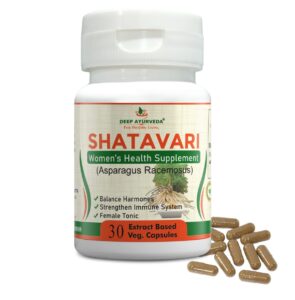 Shatavari Capsule: Shatavari capsule is a 100% extract-based formulation that amazingly provides multiple health benefits to an individual without any side-effects. It plays a crucial role in maintaining female reproductive health. Also, it is beneficial in strengthening the heart muscles, preventing lipid accumulation, lowers cholesterol levels, enhances digestion power, manages diabetes, prevents depression, anxiety, stress, aids in weight loss, helps in balancing the doshas, acts as an anti-inflammatory, anti-ulcer herb, provides relief from depression, mood swings, hot flashes, sweating etc, during the menstrual cycle.
Shatavari Capsule: Shatavari capsule is a 100% extract-based formulation that amazingly provides multiple health benefits to an individual without any side-effects. It plays a crucial role in maintaining female reproductive health. Also, it is beneficial in strengthening the heart muscles, preventing lipid accumulation, lowers cholesterol levels, enhances digestion power, manages diabetes, prevents depression, anxiety, stress, aids in weight loss, helps in balancing the doshas, acts as an anti-inflammatory, anti-ulcer herb, provides relief from depression, mood swings, hot flashes, sweating etc, during the menstrual cycle.
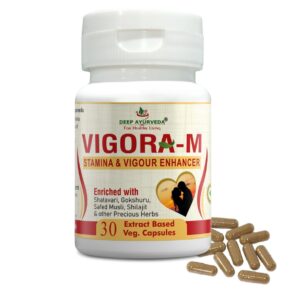 Vigora-M Capsule: Vigora-M is an herbal formulation of 100% extract-based herbs scientifically proved to overcome male health problems naturally. The capsule is mainly composed of shatavari, ashwagandha, javitari, shilajit, safed musli, kaunch beej, vidarikand, etc. The capsule helps to strengthen the nerves, work as anti-stress, anti-oxidants, mood-boosting, and rejuvenator.
Vigora-M Capsule: Vigora-M is an herbal formulation of 100% extract-based herbs scientifically proved to overcome male health problems naturally. The capsule is mainly composed of shatavari, ashwagandha, javitari, shilajit, safed musli, kaunch beej, vidarikand, etc. The capsule helps to strengthen the nerves, work as anti-stress, anti-oxidants, mood-boosting, and rejuvenator.
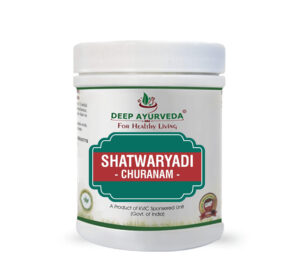 Shatavaryadi Churna: Shatavaryadi churna is rich in anti-oxidants and anti-inflammatory properties, effectively work in physical as well as mental ailments like it helps in reducing mood swings, relieves stress and anxiety, pacifies vata, pitta, and kapha dosha, acts as a reproductive tonic, relieves menstrual cramps, menopause symptoms, etc. This churna is a blend of Shatavari, Bala, Atibala, Kaunch beej, Gokshur, etc.
Shatavaryadi Churna: Shatavaryadi churna is rich in anti-oxidants and anti-inflammatory properties, effectively work in physical as well as mental ailments like it helps in reducing mood swings, relieves stress and anxiety, pacifies vata, pitta, and kapha dosha, acts as a reproductive tonic, relieves menstrual cramps, menopause symptoms, etc. This churna is a blend of Shatavari, Bala, Atibala, Kaunch beej, Gokshur, etc.
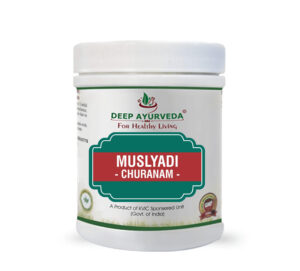 Muslyadi Churna: Muslaydi churna is a blend of Ayurvedic herbs of aphrodisiac properties and helps in the condition like premature ejaculation, erectile dysfunction, oligospermia, and other common male health problems. The churna is a blend of shatavari, shwet musli, kaunch beej, ashwagandha, etc, that are well-known for its aphrodisiac actions.
Muslyadi Churna: Muslaydi churna is a blend of Ayurvedic herbs of aphrodisiac properties and helps in the condition like premature ejaculation, erectile dysfunction, oligospermia, and other common male health problems. The churna is a blend of shatavari, shwet musli, kaunch beej, ashwagandha, etc, that are well-known for its aphrodisiac actions.
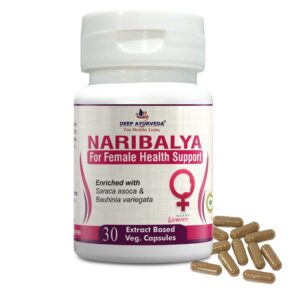 Naribalya Herbal Capsule: Naribalya herbal capsule is an excellent Ayurvedic formulation for female health support. It is composed of shatavari, lodhra, kanchnar, ashoka, gokshur, etc, that relieves menstrual pain, cramps, nausea, vomiting during menstrual days, and improves the functioning of the female reproductive system.
Naribalya Herbal Capsule: Naribalya herbal capsule is an excellent Ayurvedic formulation for female health support. It is composed of shatavari, lodhra, kanchnar, ashoka, gokshur, etc, that relieves menstrual pain, cramps, nausea, vomiting during menstrual days, and improves the functioning of the female reproductive system.
A quantity which we can use in a different form to get benefits of Shatavari (Asparagus racemosus):
Following are some different forms of Shatavari and their dosages:
Kshayam or juice: 2-3 tsp once daily
Churna or powder: Take ½ or ¼ tsp twice daily with milk, or lukewarm water
Vati, or tablet: 1-2 vati twice daily
Arishta or Aqueous tincture: 1-2 tsp twice daily
Avleha or paste: ¼ – ½ tsp once daily
Shatavari is one of the amazing and most effective plants for both males and females. It’s better to take the natural herb to normalize the functions rather than taking harmful chemical-based products. Adopt Ayurveda to rejuvenates and for managing the symptoms naturally.
For more detail on Shatavari (Asparagus racemosus), please visit our nearest clinic or if you want to consult with our Chief Ayurveda Consultant & Founder – Dr.Baldeep Kour, then write with detail history at info@deepayurveda.com
For regular health updates, please follow our Social Pages

